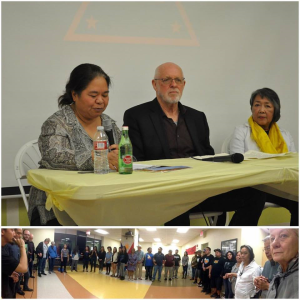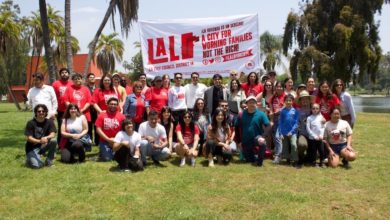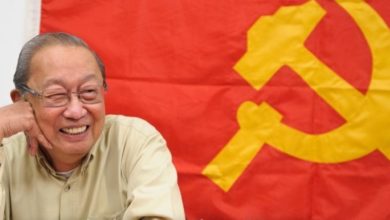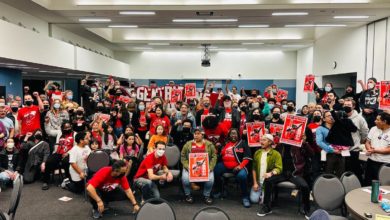
A large gathering of Filipinos and supporters took place on Feb. 27 to celebrate and commemorate the 30th anniversary of the overthrow of the brutal dictatorship of Philippine President Ferdinand Marcos. After 20 years of political repression that was met by sustained resistance, the people of the Philippines rose up in 1986 and forced Marcos to flee the to the United States.
The celebration was organized by KmB Pro People Youth of Los Angeles and took place in historic Filipinotown at the Pilipino Workers Center. Speakers included veterans of the anti-Marcos struggle, some of whom were tortured and whose family members were killed, including Carol Ojeda-Kimbrough, and Joselyn Geaga-Rosenthal. Also on the panel was Preston Wood, representing the ANSWER Coalition.
Under Marcos’1972 declaration of martial law, thousands of heroic anti-Marcos fighters, political opponents and innocent civilians were imprisoned, tortured, and murdered, all with the full support U.S.
imperialism. A willing puppet of Wall Street, Marcos was a heartless dictator and member of the ruling elite in the Philippines, always at the beck-and-call of the U.S. to carry out their global drive for power in the region.
The Peoples Power uprising was another great milestone in the long and determined struggle of the Filipino people against colonialism and occupation by Spain, Japan, and of course the United States.
Fed up with grinding poverty among the people, violence and oppression, plus electoral fraud and so many violations of human rights, the people mounted a sustained campaign of mass resistance. Thousands of resistance fighters had to go underground because of the severe police-state repression. Thousands gave their lives to the cause of freedom.
Wherever the United States goes, it creates a terrible legacy of suffering and bloodshed, starvation, torture, and the theft of resources and labor. The history of U.S. involvement in the Philippine is shocking and criminal. With the exception of the Japanese brutal occupation, starting in December of 1941 right after Pearl Harbor, where the Japanese occupiers murdered thousands of Japanese and U.S. soldiers – one of the worst war crimes ever documented — the U.S. has retained its dominance over the Philippines, including the economy, its lands, its resources.
As a strategic outpost for U.S. in Asia, where tensions are rising with the new so-called U.S. “Asia-tilt”, the U.S. continues to keep warships, troops and other military in the Philippines. Many scandals involving beatings, murders, and rape of Filipino civilians have angered the people there and shocked people around the world. The murder of Jennifer Laude, a Filipina transgender woman, by a U.S. Marine in 2015, was met with protests and outcries from all over the world. The Marine who killed Laude was there with 3,500 other American soldiers and sailors for military war games as part of the Visiting Forces Agreement signed earlier that year.
Following the panel discussion, Eddy M. Gana, Jr, Chairperson of KMB Pro-People Youth spoke eloquently about the significance of the People Power Revolution for today’s youth:
“I was born two years after the People Power Revolution of 1986. I’ve heard from revisionists who said Ferdinand Marcos was a good leader because he was intelligent and that Martial Law was great for the Philippines. NO! He was a murderer. Martial Law led to the torture and deaths of thousands of Filipino civilians. The U.S. profited from the rising national debt.
“Thanks to the stories by those who survived the Marcos regime, many learned this truth. Today, the Philippine economy is in shambles, the U.S. has increased military presence, and his only son Bongbong Marcos is running for Vice President.
“As youth, it is our duty to ensure that history is not repeated. It’s been 30 years since People Power. I am about to turn 28. I wake up today reflecting on Carol Ojeda-Kimbrough, Preston Wood, and Joselyn Geaga-Rosenthal’s stories, and I am inspired to continue this work with my kasamas (comrades) educating and organizing in our local community.”





